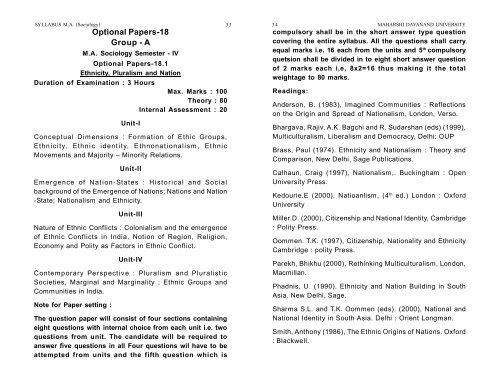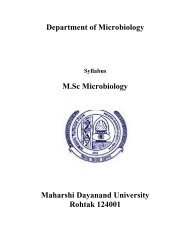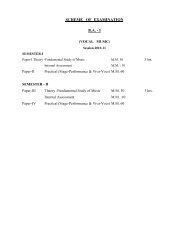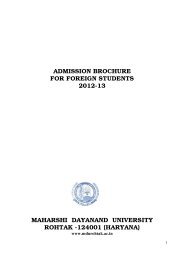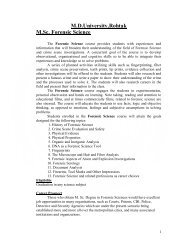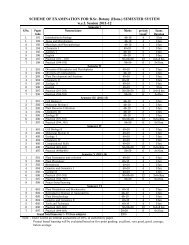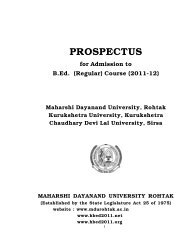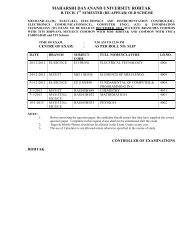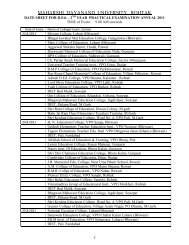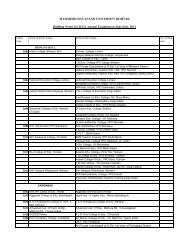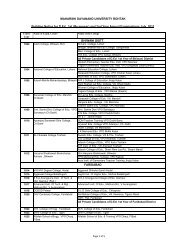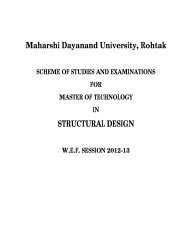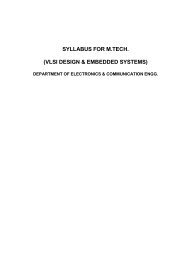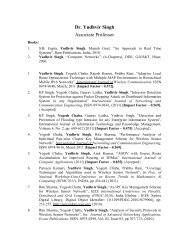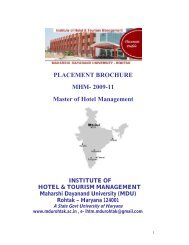Maharshi Dayanand University Rohtak
Maharshi Dayanand University Rohtak
Maharshi Dayanand University Rohtak
Create successful ePaper yourself
Turn your PDF publications into a flip-book with our unique Google optimized e-Paper software.
SYLLABUS M.A. (Sociology) 33 34<br />
MAHARSHI DAYANAND UNIVERSITY<br />
Optional Papers-18<br />
Group - A<br />
M.A. Sociology Semester - IV<br />
Optional Papers-18.1<br />
Ethnicity, Pluralism and Nation<br />
Duration of Examination : 3 Hours<br />
Max. Marks : 100<br />
Theory : 80<br />
Internal Assessment : 20<br />
Unit-I<br />
Conceptual Dimensions : Formation of Ethic Groups,<br />
Ethnicity, Ethnic identity, Ethnonationalism, Ethnic<br />
Movements and Majority – Minority Relations.<br />
Unit-II<br />
Emergence of Nation-States : Historical and Social<br />
background of the Emergence of Nations; Nations and Nation<br />
-State; Nationalism and Ethnicity.<br />
Unit-III<br />
Nature of Ethnic Conflicts : Colonialism and the emergence<br />
of Ethnic Conflicts in India, Notion of Region, Religion,<br />
Economy and Polity as Factors in Ethnic Conflict.<br />
Unit-IV<br />
Contemporary Perspective : Pluralism and Pluralistic<br />
Societies, Marginal and Marginality ; Ethnic Groups and<br />
Communities in India.<br />
Note for Paper setting :<br />
The question paper will consist of four sections containing<br />
eight questions with internal choice from each unit i.e. two<br />
questions from unit. The candidate will be required to<br />
answer five questions in all Four questions wil have to be<br />
attempted from units and the fifth question which is<br />
compulsory shall be in the short answer type question<br />
covering the entire syllabus. All the questions shall carry<br />
equal marks i.e. 16 each from the units and 5 th compulsory<br />
quetsion shall be divided in to eight short answer question<br />
of 2 marks each i,e, 8x2=16 thus making it the total<br />
weightage to 80 marks.<br />
Readings:<br />
Anderson, B. (1983), Imagined Communities : Reflections<br />
on the Origin and Spread of Nationalism, London, Verso.<br />
Bhargava, Rajiv, A.K. Bagchi and R. Sudarshan (eds) (1999),<br />
Multiculturalism, Liberalism and Democracy, Delhi; OUP<br />
Brass, Paul (1974). Ethnicity and Nationalism : Theory and<br />
Comparison, New Delhi, Sage Publications.<br />
Calhaun, Craig (1997), Nationalism,. Buckingham : Open<br />
<strong>University</strong> Press.<br />
Kedourie.E (2000), Natioanlism, (4 th ed.) London : Oxford<br />
<strong>University</strong><br />
Miller.D. (2000), Citizenship and National Identity, Cambridge<br />
: Polity Press.<br />
Oommen. T.K. (1997), Citizenship, Nationality and Ethnicity<br />
Cambridge : polity Press.<br />
Parekh, Bhikhu (2000), Rethinking Multiculturalism, London,<br />
Macmillan.<br />
Phadnis, U. (1990), Ethnicity and Nation Building in South<br />
Asia. New Delhi, Sage.<br />
Sharma S.L. and T.K. Oommen (eds). (2000), National and<br />
National Identity in South Asia. Delhi : Orient Longman.<br />
Smith, Anthony (1986), The Ethnic Origins of Nations. Oxford<br />
: Blackwell.


